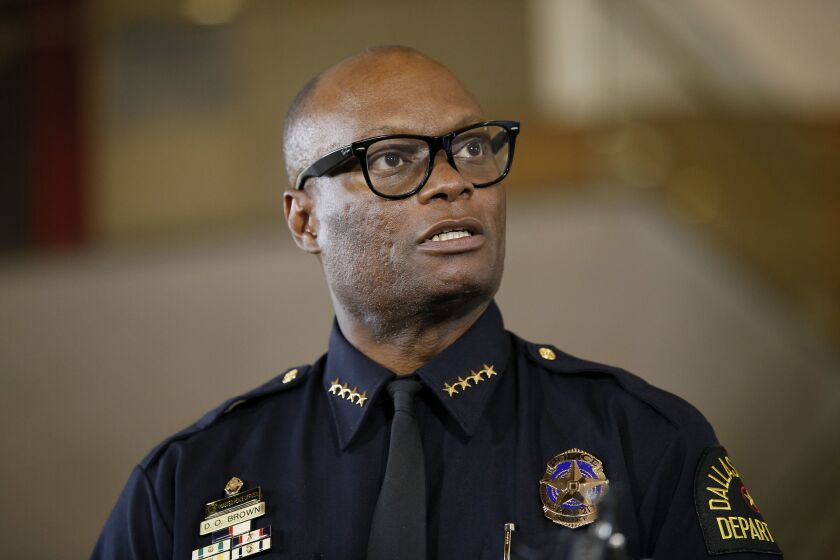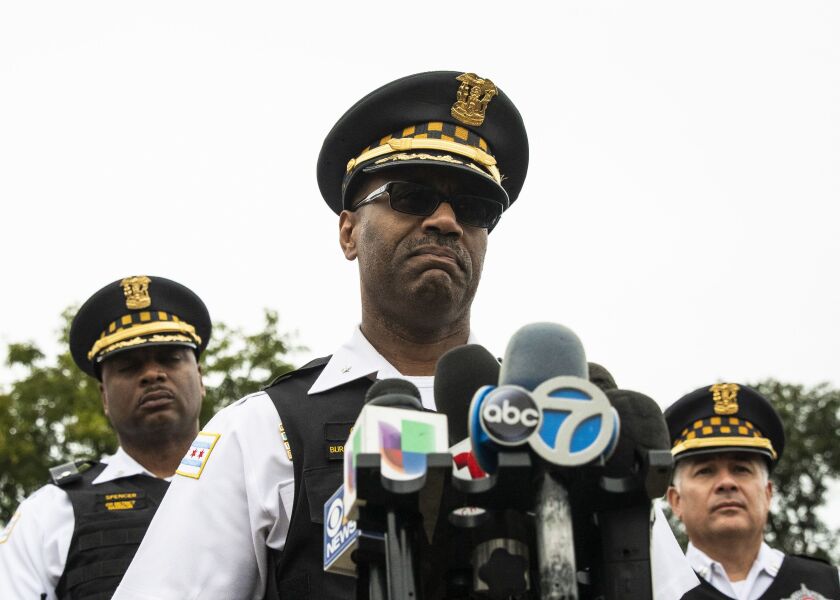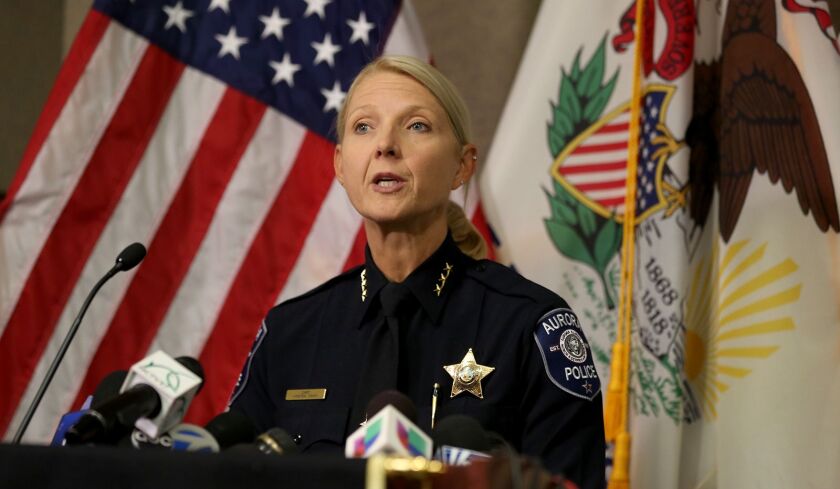Here’s a little about the each of the three finalists for the job of superintendent of the Chicago Police Department.
Kristen Ziman, David Brown and Ernest Cato are the three finalists chosen by the Chicago Police Board after a nationwide search, according to a City Hall source.
David Brown, former Dallas police chief
In his 2017 book “Called to Rise,” Brown said he grew into a community-policing philosophy.
As a patrol officer in the ‘80s, he wanted to “put the criminals in jail and let God sort them out.” But his views changed after he was assigned to Dallas’ community-policing program in the ‘90s.
“I transformed to a community-oriented policing type of chief,” he said in a TV interview about his book.
Brown, who retired as the Dallas police chief in 2016, asked his officers to host basketball games for young people and go to homeowners’ meetings and block parties to meet the people on their beats.
Brown, who is African American, often talks about how his interactions with white classmates helped shape his views on race. He tells the story of being bused to an all-white school and having problems fitting in. A white classmate invited him to dinner when he was 11 and his friend’s mom made them pot pies. They became best friends.
“And God knows what I would be thinking about people if Mike hadn’t invited me to dinner,” he told CBS’s “Face the Nation,” adding, “Let’s not be so divided.”
He said a few white officers “don’t deserve to be in the profession” because of their attitudes toward African-Americans, but that’s “a small number.”
“The vast majority of cops do the job the right way and deserve our support,” he said.
Brown, 59, also says society has asked police officers to do too much, such as dealing with mentally ill people and people with drug addictions. Society hasn’t done enough to fund treatment for those problems, he says.
Early childhood education is a big factor in helping kids from low-income neighborhoods succeed and stay out of trouble, Brown says. He says he’s an example.
Brown got mostly positive reviews from the Dallas media for his time as chief.
But late in his six-year tenure, violent crime rose in Dallas after several years of large declines. The number of murders in Dallas jumped in 2015 and 2016, along with overall crime.
Brown also came under criticism from police unions that claimed he promoted friends and punished critics. He responded that they didn’t like his holding cops accountable.
Chicago Police Deputy Chief Ernest Cato III
The 54-year-old Cato grew up in West Garfield Park and became a Chicago police officer in 1990. Cato served as a tactical officer on the South Side, then became a supervisor of investigations in the city’s inspector general’s office and a detective investigating sex crimes and homicides.
Cato was promoted to sergeant in 2011 and lieutenant in 2015, assigned to the Austin District on the West Side. He was known for trying to improve the relationship between cops and residents in the Far West Side neighborhood.
In 2017, former police Supt. Eddie Johnson appointed Cato as the Austin District’s commander. Rank-and-file cops say Cato was a “by the book” commander and seen as one of the “anointed ones” under Johnson.
But anti-violence advocates say Cato would be seen in the wee hours patrolling Austin’s problem areas, and they talk about how he set up a job fair on a drug corner and brought in big companies like Amazon to do job interviews.
At a community meeting hosted by Ald. Jason Ervin (28th), Cato emphasized community policing, saying he hoped more block clubs would form in Austin.
Cato was promoted to deputy chief of patrol in October.
Rev. Ira Acree, pastor of the Greater St. John Bible Church, praised Cato’s tenure as a police commander, telling the Austin Weekly News: “We’re a long way from where we used to be.”
Aurora Police Chief Kristen Ziman
She’s experienced at battling gang-related violent crime, but on a far smaller level than Chicago.
The Aurora Police Department is the second biggest one in Illinois, but has fewer officers than many of Chicago’s police districts.
Ziman, 46, grew up in Aurora, went to college there and was a cadet in the Aurora Police Department. She joined the police force in 1994 and worked in patrol, field training, and community policing before she rose in the ranks to chief in 2016.
Ziman is active in national police organizations. She gained attention across the country for her cool performance during the mass shooting in February 2019 at the Henry Pratt Co., where a disgruntled employee killed five co-workers and injured six people, including five officers, before police killed the gunman.
She was invited by Rep. Bill Foster, D-Ill., to attend President Donald Trump’s Feb. 4 State of the Union address in Washington because of her leadership during the mass shooting.
“It’s important to see government working well and officers holding to the oath they swore,” Foster said in a TV interview.
Ziman said the Henry Pratt shootings showed officers need to train for such incidents. “When one got shot the others kept going in to stop that threat — that is all about preparation and training,” she said.
Ziman also stresses the need for community outreach.
In a 2016 interview with the Beacon-News, she said, “The fact is, there are gaps in this community when it comes to how we deal with the Hispanics and African American population. We have a bridge to build. I want to change the hearts and minds one contact at a time.”
Ziman’s personal blog gives some more insights into her thinking. In one blog post, she talked about meeting with students about gun violence in Aurora. Two young women, ages 15 and 20, had been shot to death a week earlier in Aurora.
“It occurred to me that in my interactions with our young citizens, I do more talking than listening,” she wrote.
A lot of the students talked about bad parenting, Ziman said.
“They want boundaries. They crave rules. They want supervision,” she wrote.
In another post, “20 Things I’ve Learned in the Past Decade,” offered observations under headings like “Life is precious,” “Stop trying to win over the haters” and “Hurt people hurt people.”
Her social-media postings have drawn some criticism.
In 2017, the Beacon-News ran an editorial saying, “If Aurora Police Chief Kristen Ziman’s view of the world gained currency, America would be a scary place for those who cherish the democratic ideals of a free press and the people’s right to know whether their government is following the laws of the land.”
The newspaper took her to task for going on Facebook and Twitter to “attack a Beacon-News reporter who had the audacity to seek information after a man wound up dead after a police stop and chase.” Police reports said the man had committed suicide with a gun.








